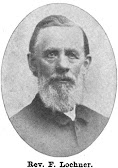The focus of today's LCMS is on liturgy and vestments, as if these can, by themselves, apart from the pure doctrine of Justification, restore and keep it "Lutheran" against Reformed tendencies. LCMS President Matthew Harrison even vents himself, making inflammatory charges against the Triglotta and thus "every well-meaning Missourian" on matters of liturgy, à la Berthold von Schenk and A. C. Piepkorn, in a 2015 CPH book preface (p. xxxii-xxxiii). (President Harrison really came out of the closet with this comment!)
So I decided to investigate the Old German Missouri Synod's teaching on this. The recognized authority on these matters among the Old Missourians was Pastor Friedrich Lochner, the author of the book recently translated by Matthew Carver and published by Concordia Publishing House in 2020, The Chief Divine Service. Lochner is now being recognized in the LC-MS for his knowledge of liturgical matters. But Lochner also wrote the book, Feste und Gebräuche in der lutherischen und katholischen Kirche, for Lutherans "to understand the difference between the Lutheran and the Catholic Church" and to be shown
"the enormous gulf that has opened up between his Church and the Catholic Church, especially since the Council of Trent."
President Harrison omits this purpose of Lochner in his "Foreword" (p. xi) to the 2020 CPH book, only saying "The reader will constantly be surprised to find that practices long believed to be 'Roman Catholic' have actually been practiced by Lutherans for centuries—starting with, or mostly continued by, Luther." Harrison therefore misrepresents Lochner's theology (as he does Walther). And since Vatican II did not overturn the dividing anathemas of the Council of Trent, the judgments in Lochner's 1897 book would still be his judgment today, and… that of the Old German Missouri Synod. The "enormous gulf" remains, even if some Roman liturgical customs have changed. But this is not taught as such by the teachers and leaders of the LCMS, which remain culpably blind to the unchanged doctrinal divide. Their justification is that Lochner's day was a "bygone day" so that we live in a "post-Vatican II world" (or "glasnost") where the Lutheran liturgy is "catholic", without distinction from Catholic. — If you have questions about any of the following customs:
- "movable" or "immovable" festivals (or feasts) • "Chasuble" • "Invocavit" • "Corpus Christi"
- "Rosary" • communion "wafers" • "Exorcism" • "Last Unction" • "Confirmation", etc.,
and many more like them, then this book gives the best brief summary of the customs of the Roman Catholic Church, and the Lutheran Church of Luther's Reformation. — Several hours were spent on the following translation to polish and add navigational hyperlinks for the ease of American readers. Although errors remain, yet I find it quite instructive as it is, and will be referring to it as needed:
True Lutherans need a better source of information and history than the LCMS on matters of liturgy and vestments. The exception to this is that in the 2020 CPH English translation of Lochner's book on liturgy, Matthew Carver and associates did the laborious and much needed work of conforming an English version to Lochner's German hymn and chant lyrics and music. Wonderful! But Matthew Harrison's teaching is not that of Lochner's, who explicitly, and prominently, upheld the Lutheran teaching against the Roman Catholic Church, including the doctrine of the Antichrist (also here). (Lochner was published first for his doctrinal articles (e.g. here, here, etc.), sermons and sermon books in Der Lutheraner in 1859, 1867, 1872, etc. (Search "Lochner" here.) Sorry President Harrison, but you have picked the wrong liturgist to praise, for "Missourian" Lochner also testifies against… you and your LCMS. Better to read from Lochner, not from the LCMS on liturgy and vestments. — In Part 2, we investigate how C. F. W. Walther viewed the importance of liturgy and vestments in the Lutheran Church. Then in Part 3, we are treated to an array of pertinent Luther quotes, many of which have never been translated into English. The concluding Part 4 will give a defense against a prominent LCMS group… (Gottesdienst)
[A PDF viewer of the above book is available below this break:]



No comments:
Post a Comment
Comments only accepted when directly related to the post.